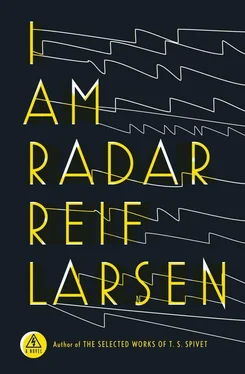“It’s Baudelaire,” whispered Lars after a moment. “He’s reading Baudelaire.”
“He’s not reading,” said Horeb. “He knows it by heart.”
Indeed, the book was only a prop. The professor was speaking from memory. The crowd listened intently. When the poem was finished, the professor bowed again, then began walking toward the water, his driver following closely. The crowd shuffled forward. Funes walked onto one of the barges, all the way to the end, and, with everyone watching, ceremoniously ripped out one of the pages from the small book from which he had just read, held the page aloft, and then tossed it into the river. The page fluttered, somersaulted, came to rest on the surface of the water. There was a silence, and then someone from the crowd let out a trilling ululation. A cheer rose up. And now Radar and the others were surrounded by people singing, clapping, dancing.
“What just happened?” Radar asked.
“He released the good spirits into the river,” said Horeb. “The bad spirits remain in the books.”
The scene quickly morphed into a kind of organized chaos. The truck was backed right up to the water’s edge. Crowds of people began to haul the barges out of the way, and from downriver came another barge, pushed by a stout white tugboat — the pousser . This tug-and-barge operation, Radar realized, was to be theirs. The barge was guided into the newly vacated space by the docks. Several men scampered up the scaffolding of the gantry crane and into its cab. Radar could not imagine the old rusty creature actually turning on, let alone lifting a heavy container, but amazingly, the crane fired right up. A crowd of men put chains around the container of books on the back of the truck and then attached the crane’s hook. The cable went taut, the crane whinnying from the effort of extracting the container from its perch. Radar stepped backwards, sure that the chains or the crane would break, but gradually the container rose and swung perilously toward the barge, hundreds of hands guiding its path. The crowd seemed unconcerned with the danger of such an operation. Everyone wanted to touch the container, to help it on its way. The crane screeched, complained, turned, and — miracle of miracles — deposited the container onto the barge. The process was repeated with Moby-Dikt. Many hands guided the box, and soon the two containers lay parallel on the deck of the barge. A group of men went to fetch the pile of book offerings and stacked them neatly next to the first container. Radar made a rough count. Around five hundred books had been given to the Tatayababuku.
By the time all of this was finished, dusk had already settled across the river. The water had turned the color of wet steel. A cloud of mosquitoes had descended upon them, and perhaps this was why the crowd around them had subsided, but Radar still felt eyes watching his every move. Horeb went off to pray, while Funes’s driver built a small fire on the front of the metal barge. Radar thought this was a risky maneuver, given that boats and fire don’t usually mix very well, but no one else appeared troubled by this incongruity. At least the smoke from the fire did wonders in keeping the mosquitoes at bay.
Professor Funes, who had disappeared into the pousser, reappeared in the firelight.
“It’s too late to leave tonight,” he said. “They don’t dredge the channels anymore, so you must know the precise way, and even then there’s no telling if it’s clear, because the river changes every day. I would buy all the food you need here. Enough to last at least one week. We’ll stop only at night, and you can never be sure what will be on offer.”
Radar wanted to ask him about what he had witnessed that evening, about the books, about why the people believed in his magic. But before he could say anything, the professor bade them good night and withdrew.
“So what do we do now?” said Otik.
Lars smiled. “Anyone want to go shopping?”
They looked around at the darkness. The eyes watching them.
“I’ll go.” It was Horeb.
He disappeared into the crowd of faces. He was gone a long time, but when he came back he was bearing two large fish on a stick. Behind him, several men were carrying sacks of rice and three large bundles of bananas.
“Give me forty dollars,” said Horeb. “Please.”
“Forty dollars,” repeated Otik.
“For the food,” he said. “I’m not sure it will last us the whole time, but there are villages along the way. You can always buy fish. It’s the one thing we do have in this country.”
The fish had long, proboscis-like snouts. Horeb expertly cut and cleaned them with a series of easy, precise movements that Radar found mesmerizing.
“What kind are those?” he asked.
“Elephant fish,” said Horeb. “Their eyes are small, but they use an electric field to see underwater. They are also delicious.”
The fish were tossed into a pan above the fire, alongside a pot of rice and some cassava paste. They listened to the sounds of insects and the silence of the river and the elephant fish sizzling against the heat. The eyes, always watching them.
Horeb was right. The fish was delicious. Succulent and sweet, tasting of river and earth and flesh, it was just about the best thing Radar had ever eaten. He could almost taste the faint hum of an electronic field on his lips. For a couple of precious seconds, he forgot about the mosquitoes dive-bombing him from all directions.
“Let it be known that I am not pleased to be back on boat,” said Otik. “But also let it be known that I am pleased to eat this fish.”
“Thank you, Horeb,” said Lars. “We’re lucky to have you on board.”
Horeb cleared his throat.
“So I am wondering: what can I do for this team? Besides get you fish.” Radar realized that this was the question he himself had not dared to ask. A tinge of jealousy. Through his simple directness, Horeb was already poised to surpass him in the pecking order. Radar needed to learn how to be direct like Horeb. To reach out and point to what you want.
The fire crackled. No one said anything. After a moment, Lars got up and went inside Moby-Dikt. He reemerged carrying several drums.
“You said you can play.”
Horeb took one of the larger djembe s and examined the surface of the skin. He turned the drum around and around in his hands.
“I haven’t played this kind of drum before,” he said finally. “I usually play the log drum of the Lokele.”
“You see?” said Otik. “I told you. He doesn’t play. He says he plays so he gets this job.”
“It won’t speak the same language,” said Horeb.
“Try,” said Lars.
“Hand me another,” said Horeb, and he took the two drums between his knees.
The first beat hit Radar so hard in the chest, he nearly fell backwards into the river. The sound — clean, flat, true — was unlike anything he had ever heard before. A sound to be felt and tasted. A sound that penetrated deep into the marrow of his bones. Then came the next beat, and the next, Horeb working back and forth between the two drums, high and low, the rhythm picking up now, shifting, finding itself, sliding into a groove, pulling back. Horeb paused, took a breath, eyes closed, and then the drumming rolled down again, rising into the night sky, his palms caressing the skin of the drums as if he were conversing with the heavens, fingers flexed up, fingers flexed down, speaking to the night, the beats flying out across the surface of the river.
Radar heard a whoop from their invisible audience. A quick series of ululations. The darkness was filled with people. Otik looked around, his eyes alight. Radar had never seen him like this before. He heaved up his great body and hurried into Moby-Dikt. He came out with birds in his hands.
Читать дальше












